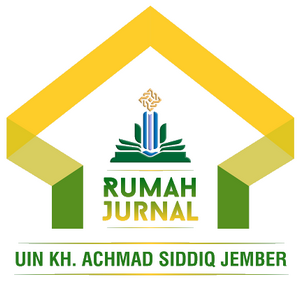Addressing Digital Religious Polarization: Policy Analysis of Religious Moderation Narratives on Indonesian Government Social Media
DOI:
https://doi.org/10.35719/aladalah.v28i1.572Digital religious polarization is becoming more common in Indonesia, threatening social cohesion significantly. The government has started programs to promote religious moderation in response to this trend. However, the efficacy of the government's official narratives disseminated on social media remains ambiguous. This study addresses this deficiency by examining the digital communication practices of the Ministry of Religious Affairs (MoRA) and the National Counter-Terrorism Agency (BNPT). This study employs a qualitative methodology, incorporating content and framing analysis of official social media accounts alongside extensive interviews with policymakers and communication experts, to investigate the factors that impede the effectiveness of the state’s top-down communication model in fostering significant public engagement. The findings indicate that the government’s normative, linear, and monologic methodology is incompatible with the interactive and emotional characteristics of the contemporary digital landscape. Conversely, personal, emotive, and testimonial narratives employed by civil society actors are significantly more effective, as they facilitate interpersonal connections. This paper argues that the state’s approach not only represents an antiquated concept of public diplomacy but may also be viewed as a sort of covert authoritarian innovation that stifles popular participation. These findings underscore the imperative for a paradigm change from monologue to dialogue, offering strategic advice for policymakers to cultivate more flexible, participatory, and ultimately more democratic communication tactics.
Downloads
References
Al-Zaman, Md. S., & Alimi, M. Y. (2021). Islam, Religious Confrontation and Hoaxes in the Digital Public Sphere: Comparison of Bangladesh and Indonesia. Komunitas, 13(2), 206–233. https://doi.org/10.15294/komunitas.v13i2.27223
Arifah, I. D. C., Maureen, I. Y., Rofik, A., Puspila, N. K. W., Erifiawan, H., & Mariyamidayati. (2025). Social Media Platforms in Managing Polarization, Echo Chambers, and Misinformation Risk in Interreligious Dialogue among Young Generation. Journal of Social Innovation and Knowledge, 1(2), 193–225. https://doi.org/10.1163/29502683-bja00011
Campbell, H. A. (2012). Understanding the Relationship between Religion Online and Offline in a Networked Society. Journal of the American Academy of Religion, 80(1), 64–93. https://doi.org/10.1093/jaarel/lfr074
Celikates, R., Kreide, R., & Wesche, T. (2015). Transformations of Democracy: Crisis, Protest and Legitimation. Bloomsbury Publishing PLC.
Curato, N., & Fossati, D. (2020). Authoritarian Innovations: Crafting support for a less democratic Southeast Asia. Democratization, 27(6), 1006–1020. https://doi.org/10.1080/13510347.2020.1777985
Davidsen, M. A. (2016). The religious affordance of fiction: A semiotic approach. Religion, 46(4), 521–549. https://doi.org/10.1080/0048721X.2016.1210392
Dodego, S. H. A., & Witro, D. (2020). The Islamic Moderation and the Prevention of Radicalism and Religious Extremism in Indonesia. Dialog, 43(2), 199–208. https://doi.org/10.47655/dialog.v43i2.375
Duncombe, C. (2020). Social media and the visibility of horrific violence. International Affairs, 96(3), 609–629. https://doi.org/10.1093/ia/iiaa055
Entman, R. M. (1993). Framing: Toward Clarification of a Fractured Paradigm. Journal of Communication, 43(4), 51–58. https://doi.org/10.1111/j.1460-2466.1993.tb01304.x
Fuadi, Moh. A., Faishol, A., Rifa’i, A. A., Triana, Y., & Ibrahim, R. (2024). Religious Moderation in the Context of Integration between Religion and Local Culture in Indonesia. Journal of Al-Tamaddun, 19(1), 47–59. https://doi.org/10.22452/JAT.vol19no1.4
George, R. (2025). Faith in the Digital Age: Exploring the Changing Diaspora of Religious Tourism. In P. K. Tyagi, N. Sharma, P. Singh, & V. Bhatt (Eds.), Technology and Religious Tourism: Emerging Trends, Cases and Futuristic Perspectives (p. 0). Emerald Publishing Limited. https://doi.org/10.1108/978-1-83662-260-420251009
Gumuruh, A. R. (2023). Religious Moderation in The Context of Pancasila: A Study of Role and The Impact is Deep Maintaining Social Harmony. Islamika Inside: Jurnal Keislaman Dan Humaniora, 9(1), 1–19. https://doi.org/10.35719/islamikainside.v9i1.243
Hadiyanto, A., Putri, K. Y. S., & Fazli, L. (2025). Religious moderation in Instagram: An Islamic interpretation perspective. Heliyon, 11(4), e42816. https://doi.org/10.1016/j.heliyon.2025.e42816
Hallinan, B., Scharlach, R., & Shifman, L. (2022). Beyond Neutrality: Conceptualizing Platform Values. Communication Theory, 32(2), 201–222. https://doi.org/10.1093/ct/qtab008
Hopkins, N., & Kahani-Hopkins, V. (2009). Reconceptualizing extremism and moderation: From categories of analysis to categories of practice in the construction of collective identity. British Journal of Social Psychology, 48(1), 99–113. https://doi.org/10.1348/014466608X284425
Humaizi, Nik Hasan, N. N., Dalimunthe, M. A., & Ramadhani, E. (2024). Harmony in virtual space: Forum Kerukunan Umat Beragama (FKUB) development communication in creating digital literacy based on religious moderation Pusat Pengajian Komunikasi, Universiti Sains Malaysia. Journal of Infrastructure, Policy and Development, 8(7), 4299. https://doi.org/10.24294/jipd.v8i7.4299
Husna, U., & Thohir, M. (2020). Religious Moderation as a New Approach to Learning Islamic Religious Education in Schools. Nadwa: Jurnal Pendidikan Islam, 14(1), 199–222. https://doi.org/10.21580/nw.2020.14.1.5766
Kalpokas, I. (2019). Post-truth: The Condition of Our Times. In I. Kalpokas (Ed.), A Political Theory of Post-Truth (pp. 9–49). Springer International Publishing. https://doi.org/10.1007/978-3-319-97713-3_2
Kayaoglu, T. (2015). Explaining Interfaith Dialogue in the Muslim World. Politics and Religion, 8(2), 236–262. https://doi.org/10.1017/S1755048315000267
Kertamukti, R., Nasrul, M. J., Budiasa, M., & Imtinan, M. T. (2022). Instagram Religious Moderation Dialogue Space for Generation Z. Nyimak: Journal of Communication, 6(2), 229–250. https://doi.org/10.31000/nyimak.v6i2.6670
Knobloch-Westerwick, S., Mothes, C., & Polavin, N. (2020). Confirmation Bias, Ingroup Bias, and Negativity Bias in Selective Exposure to Political Information. Communication Research, 47(1), 104–124. https://doi.org/10.1177/0093650217719596
Leheza, Y. (2023). Government, Religion and Fake News. Religion and Policy Journal, 1(2), 54–60. https://doi.org/10.15575/rpj.v1i2.634
Lincoln, Y. S., Guba, E. G., & Pilotta, J. J. (1985). Naturalistic inquiry: Beverly Hills, CA: Sage Publications, 1985, 416 pp., $25.00 (Cloth). International Journal of Intercultural Relations, 9(4), 438–439. https://doi.org/10.1016/0147-1767(85)90062-8
Marheni Muhammad, C. L. (2024). The Concept of Islam Nusantara as Viewed by Indonesian Muslim Intellectuals: Proponents and Opponents. Griffith University. https://doi.org/10.25904/1912/5762
Mietzner, M. (2020). Populist Anti-Scientism, Religious Polarisation, and Institutionalised Corruption: How Indonesia’s Democratic Decline Shaped Its COVID-19 Response. Journal of Current Southeast Asian Affairs, 39(2), 227–249. https://doi.org/10.1177/1868103420935561
Miles, M. B., Huberman, A. M., & Saldaña, J. (2014). Qualitative data analysis: A methods sourcebook (Edition 3). Sage.
Mulyana, R. (2023). Religious moderation in Islamic religious education textbook and implementation in Indonesia. HTS Teologiese Studies / Theological Studies, 79(1). https://doi.org/10.4102/hts.v79i1.8592
Nikitina, L. B. (2019). Modelling of the Image of a Person Communicating in a Messenger. European Proceedings of Social and Behavioural Sciences, Social and Cultural Transformations in the Context of Modern Globalism. https://doi.org/10.15405/epsbs.2019.03.02.123
Octavianne, H., Suhariadi, F., Mudzakkir, M. F., Trianto, D., & Chamdan, U. (2024). Identity Politics and Polarization in Contemporary Muslim Countries: The Impact of Elections, Social Media, and Global Dynamics. MILRev: Metro Islamic Law Review, 3(2), 263–286. https://doi.org/10.32332/milrev.v3i2.9909
Orton, A. (2016). Interfaith dialogue: Seven key questions for theory, policy and practice. Religion, State and Society, 44(4), 349–365. https://doi.org/10.1080/09637494.2016.1242886
Papacharissi, Z. (2016). Affective publics and structures of storytelling: Sentiment, events and mediality. Information, Communication & Society, 19(3), 307–324. https://doi.org/10.1080/1369118X.2015.1109697
Pepinsky, T. (2020). Authoritarian innovations: Theoretical foundations and practical implications. Democratization, 27(6), 1092–1101. https://doi.org/10.1080/13510347.2020.1775589
Reese, S. D. (2007). The Framing Project: A Bridging Model for Media Research Revisited. Journal of Communication, 57(1), 148–154. https://doi.org/10.1111/j.1460-2466.2006.00334.x
Ridwan, R., Hanan, D., & Astuti, T. S. (2024). Examining New Public Diplomacy and Interfaith Dialogue in Indonesia: Cases of World Peace Forum (WPF) and Religion Twenty (R20). Studia Islamika, 31(3), 477–510. https://doi.org/10.36712/sdi.v31i3.38376
Setiawan, A., Sulastri, E., Usni, Ulum, M., Meidiana, D., & Asyrofuddin, M. I. (2025). Media-Mediated Political Literacy: Assessing Information Ecosystem Dynamics and Civic Empowerment in Indonesia’s 2024 Electoral Context. Journal Scientific of Mandalika (JSM) e-ISSN 2745-5955 | p-ISSN 2809-0543, 6(9), 3745–3762. https://doi.org/10.36312/10.36312/vol6iss9pp3745-3762
Setinawati, Jeniva, I., Tanyid, M., & Merilyn. (2025). The framework of religious moderation: A socio-theological study on the role of religion and culture from Indonesia’s perspective. Social Sciences & Humanities Open, 11, 101271. https://doi.org/10.1016/j.ssaho.2024.101271
Singgih, E. G. (2023). Religious Moderation as Good Life: Two Responses to the Ministry of Religious Affairs’ Directive on Religious Moderation in Indonesia. https://doi.org/10.1163/1572543x-bja10038
Syafrizal, S., & Syamsun, T. R. (2022). Short Story for Developing Students Vocabulary in Reading Comprehension of Narrative Text in Banten. Journal of Linguistics, Literacy, and Pedagogy, 1(2), 49–57. https://doi.org/10.30870/jllp.v1i2.17679
Turner, B. S., & Nasir, K. M. (2013). Religious Authority and the New Media. In The Sociology of Islam. Routledge.
Widiyanto, A. (2023). Interfaith Dialogue in the Post-Truth Age: Challenges Strategies and Prospects. Religious Inquiries, 12(2). https://doi.org/10.22034/ri.2023.337410.1602
Zaluchu, S. E., Widodo, P., & Kriswanto, A. (2025). Conceptual reconstruction of religious moderation in the Indonesian context based on previous research: Bibliometric analysis. Social Sciences & Humanities Open, 11, 101552. https://doi.org/10.1016/j.ssaho.2025.101552
Downloads
Section
License
Copyright (c) 2025 Ach Barocky Zaimina

This work is licensed under a Creative Commons Attribution-NonCommercial 4.0 International License.
This work is licensed under a Attribution-NonCommercial 4.0 International (CC BY-NC 4.0).
























 Al'Adalah licensed under Creative Commons Attribution-NonCommercial 4.0 International License.
Al'Adalah licensed under Creative Commons Attribution-NonCommercial 4.0 International License.